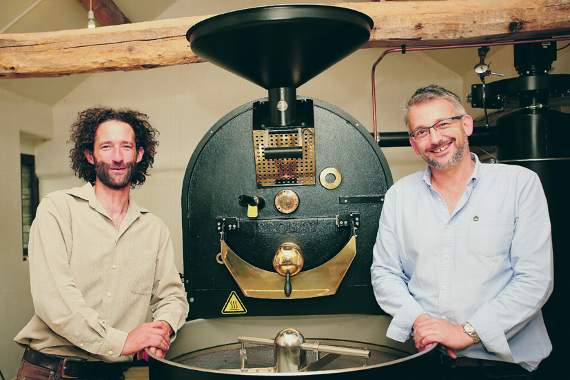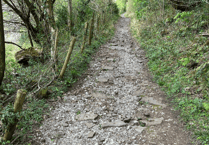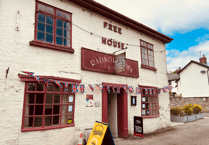YOU don’t expect coffee to be made in a small barn on the side of a mountain in Cusop, but Simon Theaker and friend Edward ’Mungo’ Leir are full of beans about their latest business venture.
The pair met eight years ago through mutual friends after Mungo was visiting the area and discovered they shared a mutual love of coffee, as well as the same business ethic.
Simon, originally from Yorkshire, fell in love with how coffee was made and the cooking process after travelling around Australia.
Mungo, originally from Ross-on-Wye moved back to the Hay area a few years ago after wanting to come back to his roots from London.
Simon, who has been roasting coffee for three years wanted to take things further and the friends went in to partnership at the beginning of the year and Simon said: "We re-branded as Black Mountain Roast and as a small business we have to be good at everything. We enjoy different things - I say I’m more of the nuts and bolts side whereas Mungo is more into sales, marketing and front of house. We have to meet in the middle as well though because there’s only the two of us."
The pair roast their coffee in a small barn attached to Simon’s parents house which is the halfway point between Llanthony Priory and Tintern Abbey.
Their roasting machine, a Probat, is made in Germany and is one of the best on the market and Simon described it as the "Rolls Royce of coffee machines."
Simon explained the roasting process and said: "The 12K roaster will make around 1,000 cups from each roast and it normally takes between 10 and 15 minutes per roast. It is designed to be making coffee constantly but we like to make small ethical batches instead.
"The beans start out covered in green shells and the machine takes off these peanut type shells, known as chaff, during the roasting process."
The chaff, which Simon said is highly flammable, is brilliant for compost as coffee is really good for gardens.
He said: "I start the roasts at around 220 degrees and then it drops really quickly to stop the sugars caramelising. Around eight minutes in to the process you will hear the ’first crack’ which is sounds like popcorn cooking. The shells come off and then the flavours start to release. I then have to tease the temperature back up until the beans are ready.
"They then come into the cooling area where the temperature drops again quickly and the coffee is put into containers where it is left to stand for 24 hours for all the gasses to release before we bag it and dispatch it."
When cooking, the coffee has no smell to begin with, before smelling like cut grass and then popcorn before the coffee smell starts to release.
Simon added that making coffee is a "complicated art form" as it’s so easy for the "sugars to take over."
Simon said that coffee is "best in the first month" and should hit "all the senses" and this is why they make small batches.
"We want it to be as fresh as possible and so we roast to order. We can also make unique tastes so if someone wants a certain flavour we can make that profile unique to them.
"We don’t leave it sitting for too long and it’s sold within a week or two. This is our selling point."
Both Simon and Mungo are passionate about their products being ethical and Simon said: "The coffee beans are grown in mountainous regions in the Southern Hemisphere and the companies we get our beans from are very ethical. They get them from the same farm each year and pay them correctly.
"They are hand picked when the beans are ready, and not just when they grow. They pay a premium to have them picked at the right times and we pay a premium to make sure it is the best quality."
Mungo said the way people want their coffee has changed: "Coffee is becoming like wine, people know the type they like rather than just having coffee. Tastes are becoming educated and the pub culture has turned into coffee culture."
The coffee was originally sold in red packets but Mungo wanted to re-brand: "The bag is contemporary and the packaging reflects the quality of what’s inside the bag. The red kite logo keeps it local and the colours of the different types of coffee are from the Black Mountains."
The espresso coffee has just been awarded the great taste award for the second year running and Mungo said the pair have joined forces with other local businesses to expand their product.
"We have combined forces with Nom Nom Chocolate and Chase Distilleries, both local companies, to create an Espresso Martini chocolate bar which goes on sale at the end of September. We want to keep things local and Mike at the Old Stable Tea Rooms has been playing around and has made an espresso marmalade."
Simon, who clearly loves his job added: "I love coming to work. It’s not like a job. It’s great."




